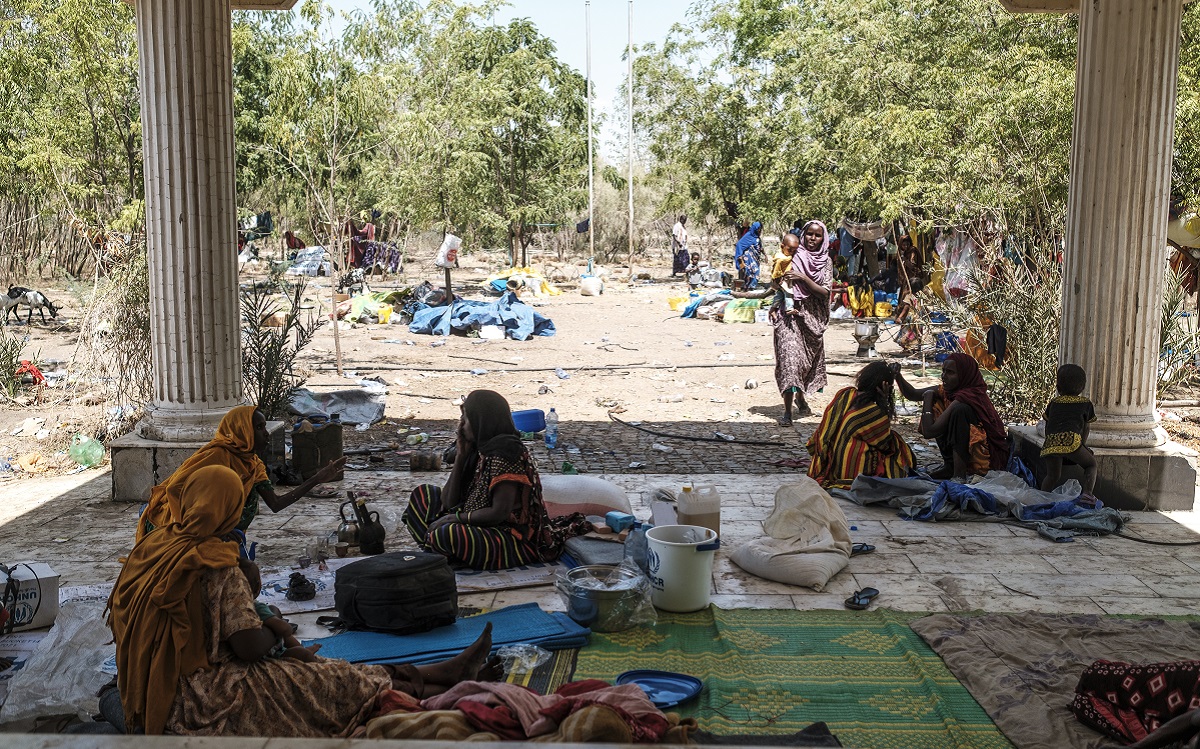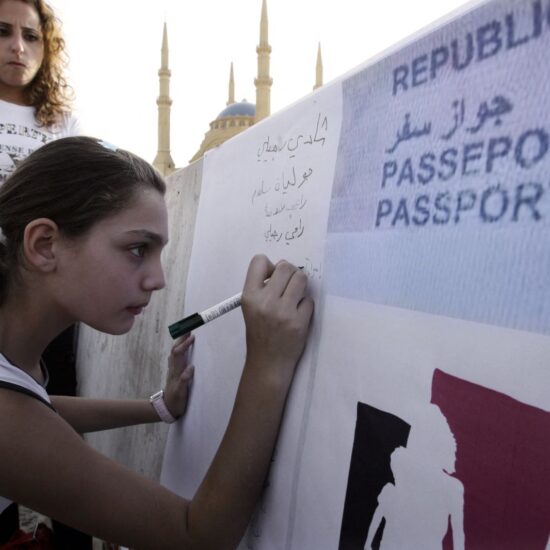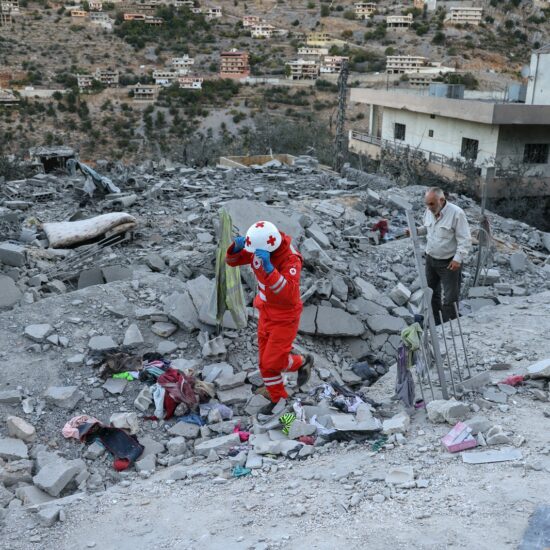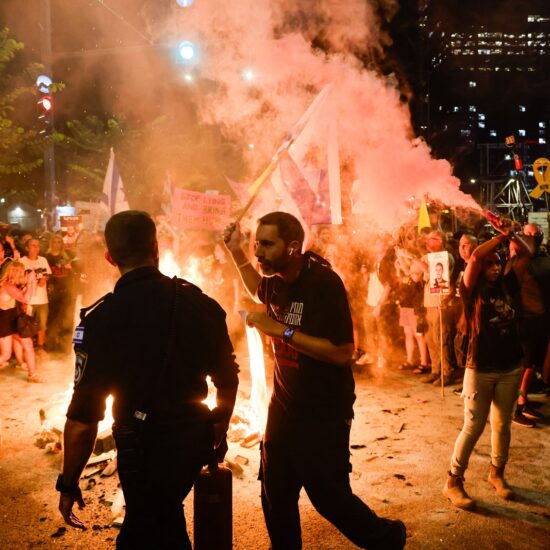
Derebe A., 26, is an indispensable part of my Lebanese family.
Since 2018, she has been taking care of my 70-year-old grandmother and my 85-year-old grandfather. Derebe’s presence in the home entailed her taking part in our farewells, reunions, and holidays. She is part of our family, enjoying the good times and enduring the bad.
And the past years have been bad. We’ve been through the loss of life savings, soaring prices, blackouts, and ultimately, a Hiroshima-esque bomb not a mile away.
Now, Derebe is caught between two disastrous situations: Lebanon, a country in shambles, and her native Ethiopia, a country at war.
The news was all about the war in Ukraine last month when Derebe discovered that her Oromo family in Ambo, a small town not far away from Ethiopia’s capital city of Addis Ababa, had been displaced, and she could only contact them sporadically.
Following the news of the death of her Aunt’s son, who was caught up in the skirmishes near their home town, Derebe also learned on March 15 that her aunt is in a critical condition. She had been shot in the leg as the Amhara tribal militia was “escorting” most of the inhabitants outside of the town. The war had reached her side of the country, and many towns were being evacuated. The last time she had contact with her family, they were being escorted by rebel groups outside of the village and were led to stay in an abandoned school with other evacuees.
The war at home
Last week, the Ethiopian government announced a unilateral truce. This comes after several months of infighting between rival tribes and the Ethiopian army.
Ethiopia’s recent bloody history of civil unrest and tribal fighting comes after a decade of relative peace. Before his “fall from grace”, Prime Minister Abiy Ahmed had been at the receiving end of great recognition and exaltation from the international community. For his efforts to end the war with Eritrea, he was awarded the Nobel Peace Prize. TIME magazine even featured him in their list of most influential people in the year of 2019, and, he was showcased as an Africa president for the future.
But when he tried to merge the Ethiopian People’s Revolutionary Democratic Front coalition with several opposition parties, a project meant to blur ethnic lines and move the political system away from ethnic federalism, Abyi Ahmed was too bold. The Tigray People’s Liberation Front, a strong political faction that dominated the country for almost three decades, and which is known for the repressive regime it imposed on Ethiopia, refused to join the new Prosperity Party. Moreover, the Tigray militia accused the PM of being an illegitimate ruler because he postponed the elections in 2020 due to ther COVID-19 crisis.
In response, the TPLF eventually held separate elections in the summer of 2020. The war started on November 3, 2020, with an attack by the Tigray militia against the national army command in the Tigray region. The army and police forces responded by invading the region. Over 10,000 people have been killed since. The conflict has created a huge humanitarian crisis. All parties involved have been reported to have committed war crimes, including mass rape and summary executions. Girls as young as 8 years old and women as old as 72 were raped in front of their families.
Amharan(Fano) militias and the Eritrean military also became part of the conflict alongside the Ethiopian state forces as the war spread. During the past summer, the TPLF launched a massive counter-offensive and marched on Addis Ababa. Forming an alliance with the Oromo Liberation Army (OLA) – a splinter of the Oromo Liberation Front that signed a peace deal with the federal government in 2018 – the TPLF came very close to entering the capital, but eventually, it was forced to withdraw.
Living with abuse
Before the economic crash and the October 17 uprisings, there were over 100,000 Ethiopians living and working in Lebanon under the unjust kafala sponsorship system, which binds them to one employer and strips them of many rights. In recent years, with their Lebanese employers unable to pay salaries, many Ethiopians, as well as migrant workers of other nationalities, have left Lebanon.
Many have also seen a much harsher fate. According to reports by Lebanon’s Anti-Racism Movement, an organization that defends the rights of migrant workers, at least 18 migrant workers have died in “mysterious conditions” since April 2020. Their deaths have not been followed by any serious investigation by Lebanese law enforcement. In at least ten cases, the victims were Ethiopians. Their deaths have received little attention in Lebanese media and Lebanese society in general. In the media, they are often identified only by their first name and country of origin, and on some occasions, neither are mentioned.
Ethiopian migrant workers in Lebanon also suffer abuse by employers, who often restrict their right to free movement, confiscate passports, and refuse to pay their monthly wages. In June 2020, eight months into the financial crisis that saw the Lebanese pound crash, employers began to fire their Ethiopian domestic workers and simply abandon them in front of their home country’s consulate in Beirut.
Though the war in Ethiopia is affecting a huge and essential community within Lebanon, it is met with ignorance or indifference in Lebanese society and media, undoubtedly due to classism and racism.
After the Beirut Blast that killed over 200 people, wounded thousands and left hundreds of thousands without homes, the International Organization for Migration announced that between 15,000 -30,000 migrant workers had been affected by the explosion.
Lebanon’s first lawsuit by a domestic worker against an employer has also been filed by an Ethiopian migrant. The 40 year-old woman had been locked up in her employer’s house for over eight years, forced to work over 15 hours a day without compensation or days off, and subjected to verbal and physical abuse.
The war at home has created a novel reality for Ethiopians in Lebanon. As with all nations and peoples, the inescapable tragedies of war propagate to the diaspora.
No way to help
With little help from institutions or organizations, the support network on Whatsapp and Facebook are all many Ethiopians in Lebanon have left to remain connected and emotionally supported. Otherwise, their suffering is virtually invisible. They share videos of war and tell each other news from home, hoping for another phone call from their families.
Lebanese apathy towards the Ethiopian and other migrant communities is nothing new. However, as young Lebanese continue to leave their homes in pursuit of better lives and ways to support their families back home, this luxury of indifference ought to be broken.
For some, the horrors of the Kafala system may seem too burdensome an issue to deal with in the Lebanese context of a crumbling society. Yet, it should in fact make us more empathetic. We, as Lebanese, should be able to relate to their distress, as we have experienced similar anguish.
Much of Lebanese society now relies on relatives abroad to send aid home when the country was at war when the economy collapsed and we needed medicine and other supplies when the Beirut port blew up destroying half of our city and our lives with it. Lebanese from around the world are accustomed to stepping up by sending aid, facilitating immigration, and lobbying their host countries’ governments.
However, Lebanese abroad are generally given the rights awarded to all resident foreigners in host countries. Ethiopians in Lebanon, on the other hand, are denied their rights and stripped of their basic liberties.
The Kafala system prevents Ethiopian workers in Lebanon from offering any refuge to their loved ones and often even from traveling back home. Ethiopians like Derbebe and Tigist are not even able to send money to their families, who are victims of war. Unable to go to Ethiopia, nor offer their families refuge here, these Ethiopians feel trapped, with no one willing to listen. “I cannot help, all I can do is wait to hear a phone call,” Derebe told me the other day.
To make matters worse, the Ethiopian war does not receive the considerable media coverage that other conflicts like Ukraine and Syria do. Though the war in Ethiopia is affecting a huge and essential community within Lebanon, it is met with ignorance or indifference in Lebanese society and media, undoubtedly due to classism and racism.
What is to become of Ethiopia is yet unclear. But Derebe’s heartfelt story is one that deserves our attention. Many Lebanese are ignorant of the hardships Ethiopians have been going through in Lebanon, though the natural thing is to be cognizant of their needs in these tough times.
Mohamad A. Hamdan is a writer and an I/P commentator. He tweets at @modbeirut.
The opinions expressed are those of the author only and do not necessarily reflect the views of NOW.








